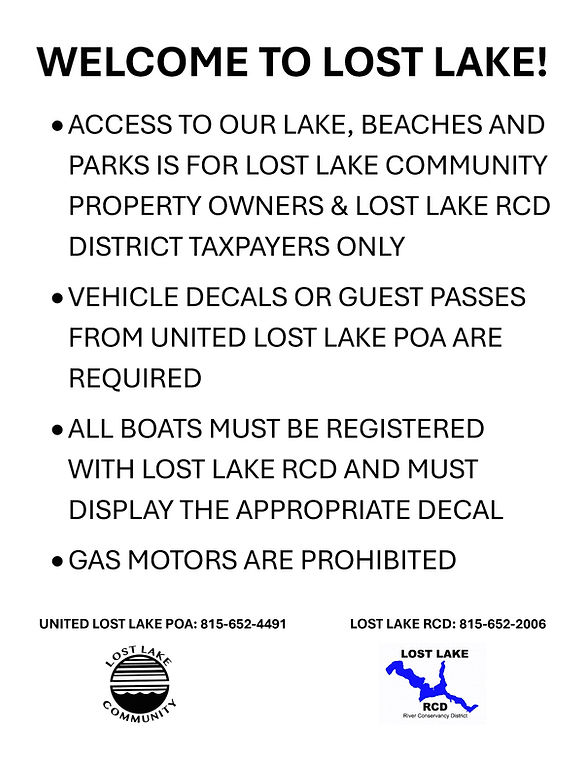
Beaches


The Lost Lake RCD owns and manages the two lake swimming beaches within the Lost Lake community: "West Beach", and "North Beach". The West Beach is located on the West side of the community along Birch Lane, while the North Beach is on the East side of the community at the end of Beech Lane. Both beaches have porta-potties, picnic tables and charcoal grills.
The following rules govern the use of the beaches and shall be enforced by the Lost Lake RCD:
SWIM AT YOUR OWN RISK; NO LIFEGUARD PRESENT
1. The beach water is not suitable for drinking. Avoid swallowing water.
2. Admission to the beach may be refused to all persons having any contagious disease, infectious conditions such as colds, fever, ringworm, foot infections, skin lesions, carbuncles, boils, diarrhea, vomiting, inflamed eyes, ear discharges, or any other condition which has the appearance of being infectious. A person under the influence of alcohol or exhibiting erratic behavior shall not be permitted in the beach area.
3. Littering is prohibited. In addition, no food, drink, gum or tobacco is allowed in the water. Glass containers are prohibited throughout the beach area.
4. All children who are not toilet trained shall wear tight-fitting rubber or plastic pants.
5. No one should swim alone.
6. Persons under the age of 16 must be accompanied by a responsible person 16 years of age or older.
7. Personal conduct within the beach area must be such that safety is not jeopardized.
8. Diving is not permitted.
9. Swimming is prohibited after sunset or before sunrise, or when thunder is heard or lightning is seen, including a 15-minute period after the last lightning or thunder is detected.
10. No pets are permitted in the beach area.
11. Feeding of wildlife or actions that encourage their presence is prohibited.
12. Protection from sun exposure is advised for persons on the beach area. Examples include wearing sunscreen, wearing clothing and hats, or staying in shaded areas.

Water Testing
To prevent illnesses associated with swimming at Illinois beaches, each licensed beach (including the two beaches within the Lost Lake community) is inspected annually to determine that required safety features are in place and there are no sources of possible pollution such as sewage discharges. These inspections are done either by the Illinois Department of Public Health or a local health department, or, in Chicago, by the Chicago Park District.
The Department also requires that each of the 335 licensed public beaches be sampled every two weeks to determine that bacterial levels in the water are within limits established in the Swimming Pool and Bathing Beach Code (77 Ill. Admin. Code 820). The maximum E. coli level allowed – 235 colony-forming units per 100 milliliters (cfu/100mL) – is based on guidelines established by the U.S. Environmental Protection Agency for recreational waters.
Two sample bottles are mailed to each licensed beach operator every two weeks, beginning in May and concluding in September, for sampling the shallow and deep areas of the beach. If both of the sample results exceed 235 cfu per 100 mL, the operator is ordered to immediately close the beach. If one of the sample results exceeds the 235 level, the facility is required to submit two additional samples. If either of those re-sample results exceeds 235 cfu/100mL, the beach is ordered to close. Beaches are allowed to reopen when both samples collected on the same day have less than 235 cfu/100mL.
The Department's regulations also contain a maximum standard for fecal coliform bacteria (500 cfu per 100 mL); the same testing frequency and closing procedures apply. Both E. coli and fecal coliform serve as good indicators of bacterial contamination because they live in the intestines of warm-blooded animals. E. coli is a subgroup of the fecal coliform bacteria. The water quality at many Illinois beaches can be influenced by heavy rainfall. If a recent heavy rainfall makes the water look cloudy, the beach may not be safe even if the most recent sample results were satisfactory. Use common sense and good judgment anytime you swim in natural waters. If the water does not look inviting, don't swim.
Since most of the swimming-related disease outbreaks in Illinois have been associated with fecal discharges from swimmers, the Department requires that all children who are not toilet trained wear tight-fitting rubber or plastic pants. Swimmers are advised not to drink the beach water.
If you have any questions about the bathing beach program, contact the Department's Division of Environmental Health at 217-782-5830.


